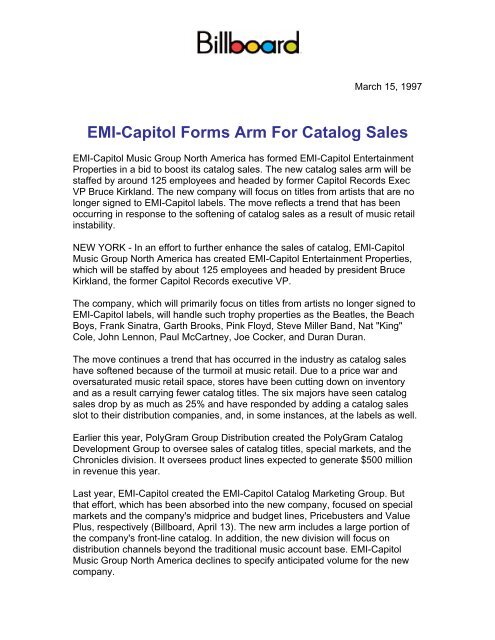EMI-Capitol Forms Arm For Catalog Sales
EMI-Capitol Forms Arm For Catalog Sales
EMI-Capitol Forms Arm For Catalog Sales
Create successful ePaper yourself
Turn your PDF publications into a flip-book with our unique Google optimized e-Paper software.
March 15, 1997<br />
<strong>EMI</strong>-<strong>Capitol</strong> <strong><strong>For</strong>ms</strong> <strong>Arm</strong> <strong>For</strong> <strong>Catalog</strong> <strong>Sales</strong><br />
<strong>EMI</strong>-<strong>Capitol</strong> Music Group North America has formed <strong>EMI</strong>-<strong>Capitol</strong> Entertainment<br />
Properties in a bid to boost its catalog sales. The new catalog sales arm will be<br />
staffed by around 125 employees and headed by former <strong>Capitol</strong> Records Exec<br />
VP Bruce Kirkland. The new company will focus on titles from artists that are no<br />
longer signed to <strong>EMI</strong>-<strong>Capitol</strong> labels. The move reflects a trend that has been<br />
occurring in response to the softening of catalog sales as a result of music retail<br />
instability.<br />
NEW YORK - In an effort to further enhance the sales of catalog, <strong>EMI</strong>-<strong>Capitol</strong><br />
Music Group North America has created <strong>EMI</strong>-<strong>Capitol</strong> Entertainment Properties,<br />
which will be staffed by about 125 employees and headed by president Bruce<br />
Kirkland, the former <strong>Capitol</strong> Records executive VP.<br />
The company, which will primarily focus on titles from artists no longer signed to<br />
<strong>EMI</strong>-<strong>Capitol</strong> labels, will handle such trophy properties as the Beatles, the Beach<br />
Boys, Frank Sinatra, Garth Brooks, Pink Floyd, Steve Miller Band, Nat "King"<br />
Cole, John Lennon, Paul McCartney, Joe Cocker, and Duran Duran.<br />
The move continues a trend that has occurred in the industry as catalog sales<br />
have softened because of the turmoil at music retail. Due to a price war and<br />
oversaturated music retail space, stores have been cutting down on inventory<br />
and as a result carrying fewer catalog titles. The six majors have seen catalog<br />
sales drop by as much as 25% and have responded by adding a catalog sales<br />
slot to their distribution companies, and, in some instances, at the labels as well.<br />
Earlier this year, PolyGram Group Distribution created the PolyGram <strong>Catalog</strong><br />
Development Group to oversee sales of catalog titles, special markets, and the<br />
Chronicles division. It oversees product lines expected to generate $500 million<br />
in revenue this year.<br />
Last year, <strong>EMI</strong>-<strong>Capitol</strong> created the <strong>EMI</strong>-<strong>Capitol</strong> <strong>Catalog</strong> Marketing Group. But<br />
that effort, which has been absorbed into the new company, focused on special<br />
markets and the company's midprice and budget lines, Pricebusters and Value<br />
Plus, respectively (Billboard, April 13). The new arm includes a large portion of<br />
the company's front-line catalog. In addition, the new division will focus on<br />
distribution channels beyond the traditional music account base. <strong>EMI</strong>-<strong>Capitol</strong><br />
Music Group North America declines to specify anticipated volume for the new<br />
company.
Charles Koppelman, chairman/CEO of <strong>EMI</strong>-<strong>Capitol</strong> Music Group North America,<br />
says the creation of <strong>EMI</strong>-<strong>Capitol</strong> Entertainment Properties "is all about focus" and<br />
not just as it concerns that company's mission but also as to how the various<br />
labels fulfill their goals.<br />
"This Monday, when someone picks up Billboard, they will see 16 of our new<br />
releases in the top 100 [of The Billboard 200]. Each of our various labels are<br />
starting to feel the fruits of their investments in terms of new releases and<br />
existing artists," he says. By putting catalog under one umbrella, <strong>EMI</strong>-<strong>Capitol</strong><br />
labels can continue to focus on developing new artists while the new company<br />
focuses on catalog, he says.<br />
In most instances, <strong>EMI</strong>-<strong>Capitol</strong> Entertainment Properties will work catalog titles<br />
for acts no longer on the company's labels. Acts signed to <strong>EMI</strong>-<strong>Capitol</strong> labels will<br />
continue to be marketed under the auspices of their respective labels, with the<br />
exception of <strong>EMI</strong> Records, which has turned over that responsibility to the new<br />
company. Other labels can assign the catalog of current artists to the new<br />
company on a case-by-case basis, if they so choose. Already, the Brooks catalog<br />
falls into that category.<br />
Although the albums will be marketed by <strong>EMI</strong>-<strong>Capitol</strong> Entertainment Properties,<br />
each label will retain its identification with its artist. "This is only about focus, it is<br />
not about disturbing the heritage of the different labels," says Koppelman.<br />
Terri Santisi, executive VP/GM of <strong>EMI</strong>-<strong>Capitol</strong> Music Group North America, says<br />
that "every major label has experienced a decline in catalog sales. We believe<br />
the growth potential is still there, but you have to be much more visionary in<br />
managing the process. The old days are gone. Companies can no longer squeak<br />
by investing a [percentage] point of sales on catalog; it takes a greater<br />
investment."<br />
Labels generally spend 3%-5% of revenue for cooperative advertising, and<br />
mainly on new releases. <strong>Catalog</strong> sales are generally advertised by price line<br />
rather than by individual title, except for reissues.<br />
Says Kirkland, "Our mantra will be to take music to the consumer and not have<br />
the consumer come to the music."<br />
He says that most catalog marketing is passive, while the new company's<br />
mission is to "take <strong>EMI</strong>-<strong>Capitol</strong>'s core catalog assets under its umbrella and to<br />
protect and develop opportunities for them."<br />
He adds, "I am very concerned that people don't just view us as a catalog<br />
company. When we look at what the competition is doing to focus on catalog<br />
sales, most are looking for answers within their distribution company."
Kirkland says that his company will build "state-of-the-art marketing tools to<br />
analyze where the consumer is and what interests they have so that we can<br />
determine the best methodology to reach them from a marketing and distribution<br />
standpoint."<br />
The core of the company is being drawn from the ranks of the <strong>EMI</strong>-<strong>Capitol</strong><br />
<strong>Catalog</strong> Marketing Group. Eli Okun, who headed that arm, has been named<br />
executive VP of the new company. It will also have executives overseeing A&R,<br />
catalog development, marketing, sales, finance, business affairs, and special<br />
projects.<br />
In addition, about 30 staffers at labels in the <strong>EMI</strong>-<strong>Capitol</strong> family will be transferred<br />
to the new company, while the remainder will be recruited.<br />
Kirkland says that in addition to music retail, <strong>EMI</strong>-<strong>Capitol</strong> Entertainment<br />
Properties will explore nontraditional retail, private-label business, and direct<br />
marketing. Koppelman adds that in going beyond traditional music retail, the<br />
company has to be careful that it doesn't merely displace sales but, instead,<br />
creates incremental sales.<br />
<strong>EMI</strong>-<strong>Capitol</strong> Entertainment Properties will also be in the market for buying<br />
catalogs as well as signing artists. The latter will only occur in the case of acts<br />
who do not need radio airplay to be marketed to consumers.<br />
"We are not a record label; we won't have a promotion department," says<br />
Kirkland. "But clearly a big part of business will be to have a new product stream,<br />
so, yes, we will be signing acts."<br />
COPYRIGHT 1997 VNU Business Media
















